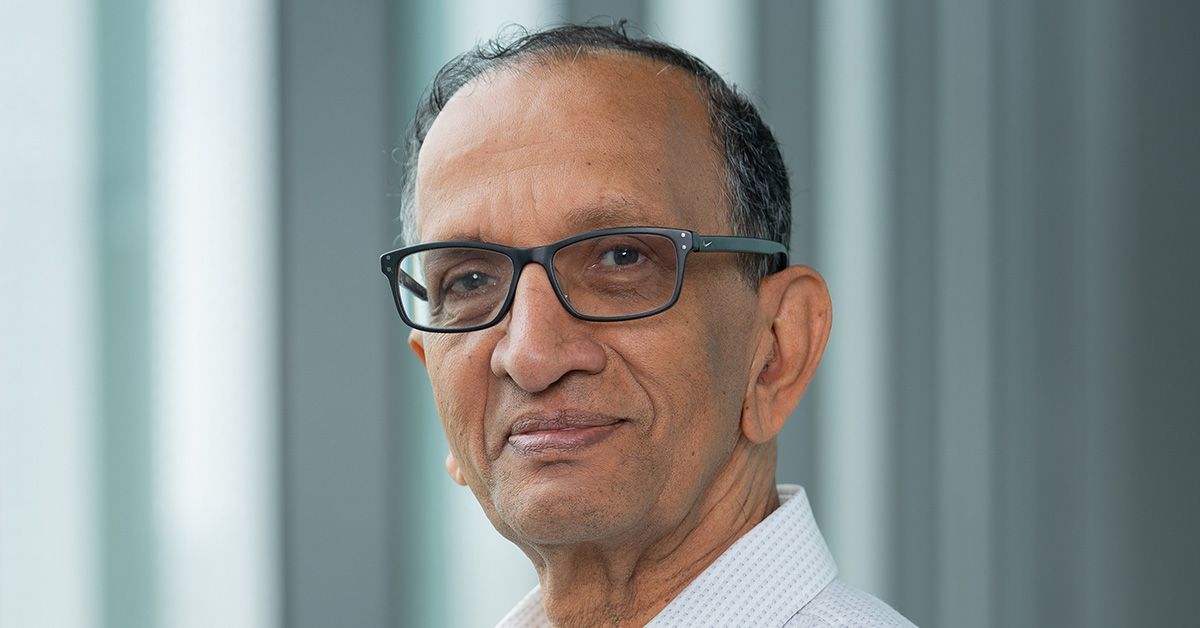UC San Diego Professor Awarded Signal Processing Society’s Highest Honor
Story by:
Published Date
Article Content
University of California San Diego electrical and computer engineering professor Bhaskar Rao has received the prestigious IEEE Signal Processing Society’s (SPS) Norbert Wiener Society Award. The prize is the society’s highest honor, recognizing Rao’s “sustained and pioneering contributions to research and education in sparsity, array processing and wireless communications.”
Rao is a distinguished member of the faculty in the UC San Diego Jacobs School of Engineering’s Department of Electrical and Computer Engineering (ECE) and an affiliate of the university’s Qualcomm Institute (QI).
“I feel honored and gratified upon receiving this award,” said Rao. “Even though I am the recipient, it is in reality a recognition of the hard work and seminal contributions that my students and my group have made to the field over many years. Such work is not possible in a vacuum and reflects the talented faculty colleagues that I am fortunate to be associated with and learn from, as well as the ECE department, the Center for Wireless Communications and the Qualcomm Institute, which created a supportive and nurturing environment.”
Rao joined UC San Diego in 1983. Since then, he and colleagues have made sweeping advancements in the fields of signal processing and wireless communications with applications for data streaming, medical imaging and more.
“Professor Rao has been the preeminent leader in the signal processing field for many decades, so we are thrilled that he is being recognized by the prestigious IEEE SPS Norbert Wiener Society Award for his lifetime’s work,” said Bill Lin, professor and ECE chair. “Though his many contributions were originally developed in the context of signal processing and wireless communications, they now have far-reaching impact in many fields. For example, Professor Rao’s work on sparsity in the context of signal recovery is now directly relevant to the fast moving field of machine learning.”
Rao’s 1998 article on sparsity identified the topic, which prioritizes efficient and consolidated solutions to problems in signal recovery, as an important theme applying widely to signal processing applications such as speech coding and magnetoencephalography, a technique for imaging the brain’s magnetic activity. For the past two decades, Rao’s group has made seminal contributions to the sparse signal recovery field, including the FOCUSS algorithms, sparse Bayesian learning algorithm, and extension to the multiple measurement vector problem, among others.
In a 1989 IEEE article, Rao and then-student colleague K.V.S. Hari created a theoretical analysis for the performance of Root-Music, an algorithm that determines the direction of incoming signals, with important implications for radars, sonars and wireless channel modeling.
“There is a quality and creativity to [Rao’s] work and an originality to his thinking that are hallmarks of his career,” said P. P. Vaidyanathan, a longtime colleague, Kiyo and Eiko Tomiyasu Professor of Electrical Engineering at the California Institute of Technology, and Rao’s nominator for the 2023 Norbert Wiener Society Award. “[The Norbert Wiener Society Award] is very competitive and a very significant honor. Bhaskar is a very good speaker; he maintains scientific integrity; and he is adored by many of his graduate students.”
Jun Zheng, a former Ph.D. student in Rao’s lab, says the foundational and innovative work Rao pioneered has led to leaps in the way we interact with wireless technologies, like cell phones. Among the subjects they undertook, multiple input, multiple output (MIMO) systems aided in creating greater data reliability, faster streaming and higher data throughput for daily use.
Now a principal staff scientist at Broadcom, Zheng says he has used what he learned in Rao’s lab throughout his career.
“He really deserves [the award],” said Zheng. “I feel very lucky to have had [him] to guide me through the very early stages of my career, and to introduce me to the right attitude and approach to problems. I think that [approach is] the reason he was able to make a very large impact in industry and the wireless communications field. He is shooting for true innovations and methodologies.”
Rao joined the UC San Diego Qualcomm Institute as an affiliate during its inauguration in 2000, and has remained an active member of its community ever since. From 2008 to 2011, he directed the Center for Wireless Communications at the Jacobs School of Engineering. Also in 2008, he was named the inaugural holder of the Jacobs School’s Ericsson Endowed Chair in Wireless Access Networks.
Following his retirement as a professor in late 2023, Rao founded the Bhaskar D. Rao Ph.D. Teaching Support Endowment Fund at UC San Diego. The endowment supports doctoral students in the Department of Electrical and Computer Engineering looking to gain teaching skills through mentorship, programs, classes, conferences or practical experience.
Rao is now a distinguished professor in the Division of Graduate Education and Postdoctoral Affairs at UC San Diego, where he will continue to mentor students and pursue new research in machine learning.
Rao will formally accept the Norbert Wiener Society Award and deliver a plenary speech at the IEEE International Conference on Acoustics, Speech and Signal Processing in Seoul, Korea, on April 17, 2024.
For more on Rao’s research, visit the full list of his publications.
Share This:
Stay in the Know
Keep up with all the latest from UC San Diego. Subscribe to the newsletter today.




